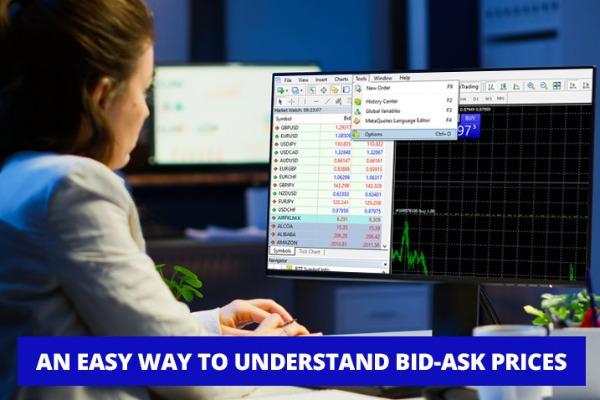It is easy to learn forex trading, but there are certain mistakes to avoid while learning to trade. What are these trading mistakes?
Forex trading can be easily learned by obtaining various learning materials from various sources, including forex books, YouTube video tutorials, e-books, trading seminars, and online courses.
These conveniences create equal opportunities for everyone to become a reliable trader. However, it is important to avoid certain mistakes when learning forex trading to achieve success. What are these trading mistakes?

1. Being Lazy
While it may seem easy to enter the forex market, you cannot ignore the complexities of learning forex trading. No topic can be skipped just because it seems less important.
For example, many traders argue that live trading experiences are the best way to learn forex. Studying the dynamics of the market and the factors that affect prices is crucial. This includes understanding economic news releases, geopolitical factors, and market sentiment that drive prices in the forex market. Unfortunately, many novice traders focus solely on technical theories and neglect to learn fundamentals.
2. Using Live Accounts Right Away
One common mistake in learning forex trading is immediately using a live account while still learning. It's essential to remember that if you're still learning, it's best to use a demo account first. Don't let FOMO (fear of missing out) tempt you because your friends are already trading with a live account.
Venturing into the market with a real account without prior trading experience is risky. Before entering the market, you should be mentally prepared and financially ready, have a dependable trading system, or have already succeeded in trading on a demo account. These are the minimum requirements to start trading.
There is no benchmark for how many times you should practice using a demo account before succeeding in trading on a live account. However, you can ensure that you are ready or not if you already know why and how exchange rates in the forex market are fluctuating. Additionally, it is also important to have psychological readiness in facing the possibility of profit and loss that will occur.
3. Using a Large Capital for the First Trade
Starting with a small amount of capital for the first trade is wise. The market's price movements are complicated to comprehend and estimate, so investing a large sum of money for the first trade is risky. By using a small capital, you can safely learn how to predict and anticipate price movements. This way, you can reduce the risks that may emerge from each transaction.
In addition, by using a small capital, you can also evaluate your trading plans and emotional management. Disciplined practice in managing emotions is crucial because unstable emotional conditions can hurt learning forex trading.
4. No Risk Management
Risk management is a must-have skill in forex trading. Why? It is important to remember that no trading system in the world can guarantee 100 percent winnings. Therefore, implementing risk management is the key to earning profits through trading.
The success of your forex trading depends on risk management. This is a way to evaluate potential losses to determine how to minimize trading risks. So, not having risk management is a huge mistake you must avoid in learning to trade.
5. Lack of Good Attitude
The next trading mistake traders often make is having a bad attitude. For example, being impatient and procrastinating. Having a bad attitude can make you more prone to losses. To avoid this, adopting a patient and disciplined attitude is recommended.
Patience in forex trading means staying calm and not reacting impulsively when your strategy doesn't work as expected. Trust your trading system and stick to your plan, even when the market conditions are unfavorable.
Discipline in trading refers to following your initial strategy, especially when setting stop loss and take profit levels. It's also crucial to manage your trading capital discipline and not let drawdowns affect your trading account balance. Being patient and disciplined can increase your chances of success in forex trading.
6. Not Applying Money Management
Protecting your trading account is crucial in mitigating the risk of losing money in forex trading. One of the essential elements that can help traders achieve success in this industry is good money management.
Good money management lets you know when to accept losses and move forward with your trading activities. Using a stop-loss strategy with a maximum daily loss limit is recommended to ensure that your losses remain within a tolerable range. You can also consider using trailing stops to safeguard your trading account.
See Also:
7. Not Having a Trading Plan
Not having a trading plan is another mistake new traders make when learning forex trading. Before entering the market, it is essential to have a well-defined plan that includes risk management, goal setting, and details on the type of trading system for forex trading. Relying on just one trading plan is not recommended.
Successful traders always have a solid trading plan. They have multiple plans, including Plan A, Plan B, and so on, for a more comprehensive and mature approach. A well-crafted trading plan enables you to determine when to enter and exit the market, manage your trading capital, and understand the maximum potential loss that could occur.
To succeed as a trader, it is crucial to steer clear of these seven mistakes when learning to trade. Forex trading is not a get-rich-quick scheme and requires a thorough learning process that all traders must fully commit to. Therefore, enjoy your learning journey!
Besides avoiding those mistakes, traders can improve their trading skills by learning from plenty of educational resources. One way to get is from brokers. Luckily, several brokers provide education features for free.

 Dedicated FREE FOREX VPS
Dedicated FREE FOREX VPS Free FOREX Virtual Private Server
Free FOREX Virtual Private Server MT4 Demo Contest, Get $500
MT4 Demo Contest, Get $500 Sign Up for an Account, Claim 60% Deposit Bonus
Sign Up for an Account, Claim 60% Deposit Bonus Free MT4/MT5 VPS 2024
Free MT4/MT5 VPS 2024 Send E-mail and Get Free Merchandise
Send E-mail and Get Free Merchandise $1K Refer a Friend Bonus for Pepperstone Pro clients
$1K Refer a Friend Bonus for Pepperstone Pro clients Maximize Your Earnings with 100% Deposit bonus
Maximize Your Earnings with 100% Deposit bonus Trade to Win, $5,000 Monthly Demo Contest
Trade to Win, $5,000 Monthly Demo Contest Claim 30% + 15% Deposit Bonus from LiteFinance
Claim 30% + 15% Deposit Bonus from LiteFinance











